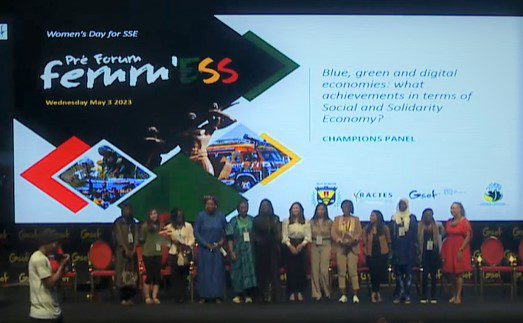APA-Dakar (Senegal) As the sixth edition of the Global Social and Solidarity Economy Forum (GSEF) got underway in Dakar, Senegal, hundreds of women leaders in the SSE sector pivotal in Africa, America and Europe have been sharing their experiences on gender economic empowerment and visible social initiatives.
During Wednesday’s pre-forum session dedicated to women, six expert women dubbed “Champions” have been rubbing minds with about 20 young leaders who are finding their feet in their respective continents and countries.
Interactions on this Women’s Day focused on the main theme “Social and economic empowerment and territorialisation of sustainable public policies” to encourage the role and place of women in the promotion of a social and solidarity-based economic model.
The panels were based on six specific themes addressing various issues of the so-called Social and Solidarity Economy.
Imen Ouardini, a Tunisian activist and expert in SSE took part in a panel interrogating the “Blue, green and digital economies: what achievements in terms of Social and Solidarity Economy?”.
She is of the belief that the SSE, as the economy of the territories and the community, is a tool for learning about citizenship and cooperation.
“It is necessary to develop participatory and efficient intervention strategies that allow for the strengthening of the socio-economic integration of populations and to achieve a great equality between the territories and even between the populations,” Imen told the audience at the Grand Theatre of Dakar.
Imen sees the blue economy of solidarity as an umbrella concept that links the social and solidarity economy with the blue economy, particularly around tourism.
She reckoned that the blue economy solidarity would be a generator of activities and jobs mainly in coastal areas while highlighting the importance of local government and civil society for the dynamism of the social economy and solidarity and blue economy in the region.
Based on her experiences, she insisted on some recommendations to promote blue economy in Tunisia, Africa, and in the Sahel region.
Among them, she listed the importance of implementing different means to conserve biodiversity, support all actors in the value chain related to this sector, as well as involve municipalities and associations in the development of a dynamic around this goal.
She spoke about the need to strengthen cooperation between universities and other institutions to be able to go beyond research and implement the various projects related to the blue economy and the social and solidarity economy.
Finally, she insisted on the importance of supporting projects that promote common solutions most urgent in the Mediterranean region.
Another Champion, Ms Khady Fall Tall, the chairperson of the West African Women’s Association (AFAO) advised the young leaders to promote clean energies such as solar technology, wind and hydropower to slow down the degradation of the environment which threatens livelihoods.
“The African continent can develop its economy-based endogenous clean solutions because it has clear energy and a young population” she stressed while deploring the power relationship between Africa and the other continents in global governance concerning climate change and industrial pollution.
Meanwhile, Ms. Marie-Lucienne Rattier, delegate advisor in charge of digital development, and the territorial collectivity of French Guyana, explained the access to credit opportunities in her country to support young entrepreneurs.
“The Guyanese financing model for the training activities is based on a private-public partnership which involves local, private, and public actors while seeking alternative public and private funding to promote the innovation,” the Guyanese champion said.
Using her capacity as an elected official, she promised to support the young leaders from Cote d’Ivoire, Madagascar and Senegal to expand the scope of their activities and promote blue economies.
The six-day Dakar GSEF (1-6 May) brings together about 5,000 participants from all the world’s continents.
The first three days were dedicated to Youth and Women pre-forums.
The main event will discussed various themes related to the social and solidarity economy.
The GSEF is a global network of local governments and civil society stakeholders committed to promoting the SSE as a path to a “different economy” for the benefit of all, a means for empowering local development, centered on social and environmental issues.
WN/as/APA


